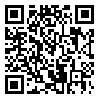Volume 29, Issue 1 (3-2020)
JGUMS 2020, 29(1): 1-10 |
Back to browse issues page
Download citation:
BibTeX | RIS | EndNote | Medlars | ProCite | Reference Manager | RefWorks
Send citation to:



BibTeX | RIS | EndNote | Medlars | ProCite | Reference Manager | RefWorks
Send citation to:
Soleimani R, Jalali M M, Bakhshayesh Eghbali B. Evaluation of Psychiatric Symptoms in Patients with Vertigo. JGUMS 2020; 29 (1) :1-10
URL: http://journal.gums.ac.ir/article-1-2242-en.html
URL: http://journal.gums.ac.ir/article-1-2242-en.html
Abstract: (3392 Views)
Abstract
Introduction: The close interaction between vestibular, psychological and neurological disorders causes inefficient treatment of the patients, so it seems necessary for the physicians to consider psychiatric disorders and get to know their different presentations so that they can offer the best treatment.
Objective: This study aimed to evaluate the frequency of psychological symptoms in patients with vertigo.
Materials and Methods: In this descriptive, cross-sectional study, 104 patients with vertigo referred to neurologic and otolaryngologic clinics of the Poursina and the Amiralmomenin hospitals in Rasht in 2014-2017, were selected by the simple sampling method. After a complete neurologic and otolaryngologic examination, the organic cause of the patient's vertigo (if any) was determined through history taking, clinical examination and necessary paraclinical measures. Then, the patients were asked to complete the SCL-90R questionnaire. Data were analyzed using t test, χ2 and logistic regression statistical tests with SPSS 22.0 software.
Results: The mean age of participants was 50.4±18.1 years, of the 46 patients (44.2%) were male and 58 (55.8%) were female (P=0.05). Thirty nine patients were with history of dizziness (37.5%). According to the SCL-90R questionnaire, 28 (27.0%) had pathologic psychological symptoms, of which about one fifth was severe. The most common psychiatric symptoms were anxiety, paranoid, interpersonal sensitivity, somatization and obsessive-compulsive disorder. There was a significant association between the mean of the general symptom index and age of participants (correlation coefficient: -0.36, P <0.001). Logistic regression analysis showed that only age and previous history of vertigo could predict significantly psychological symptoms in our patients (P values 0.004 and 0.05, respectively).
Conclusion: In patients with vertigo complaints, psychiatric disorders are common. Therefore, it is better to treat multiple aspects of the patients and pay attention to the treatment of psychiatric disorders at the onset of the disease.
Conflict of interest: non declared
Introduction: The close interaction between vestibular, psychological and neurological disorders causes inefficient treatment of the patients, so it seems necessary for the physicians to consider psychiatric disorders and get to know their different presentations so that they can offer the best treatment.
Objective: This study aimed to evaluate the frequency of psychological symptoms in patients with vertigo.
Materials and Methods: In this descriptive, cross-sectional study, 104 patients with vertigo referred to neurologic and otolaryngologic clinics of the Poursina and the Amiralmomenin hospitals in Rasht in 2014-2017, were selected by the simple sampling method. After a complete neurologic and otolaryngologic examination, the organic cause of the patient's vertigo (if any) was determined through history taking, clinical examination and necessary paraclinical measures. Then, the patients were asked to complete the SCL-90R questionnaire. Data were analyzed using t test, χ2 and logistic regression statistical tests with SPSS 22.0 software.
Results: The mean age of participants was 50.4±18.1 years, of the 46 patients (44.2%) were male and 58 (55.8%) were female (P=0.05). Thirty nine patients were with history of dizziness (37.5%). According to the SCL-90R questionnaire, 28 (27.0%) had pathologic psychological symptoms, of which about one fifth was severe. The most common psychiatric symptoms were anxiety, paranoid, interpersonal sensitivity, somatization and obsessive-compulsive disorder. There was a significant association between the mean of the general symptom index and age of participants (correlation coefficient: -0.36, P <0.001). Logistic regression analysis showed that only age and previous history of vertigo could predict significantly psychological symptoms in our patients (P values 0.004 and 0.05, respectively).
Conclusion: In patients with vertigo complaints, psychiatric disorders are common. Therefore, it is better to treat multiple aspects of the patients and pay attention to the treatment of psychiatric disorders at the onset of the disease.
Conflict of interest: non declared
Keywords: Dizziness Mental Disorders Vertigo
Review Paper: Research |
Subject:
Special
Received: 2020/03/24 | Accepted: 2020/03/24 | Published: 2020/03/24
Received: 2020/03/24 | Accepted: 2020/03/24 | Published: 2020/03/24
| Rights and permissions | |
 |
This work is licensed under a Creative Commons Attribution-NonCommercial 4.0 International License. |







